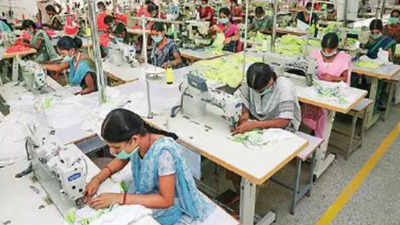COIMBATORE: With the peak season for Tirupur garment units kicking in, the industry is eyeing 10-15% growth compared to the pre-Covid levels.
Dilution of Covid fear after mass inoculation and a surge in orders for casual wear due to the work-from-home culture has been helping the garment industry get back on its feet.
President of Tiruppur Exporters Association (TEA) Raja M Shanmugam said close to Rs 28,000 crore business happened during 2019-20. “We are expecting it to cross Rs 30,000, given the positive atmosphere,” he said. “The industry witnessed significant growth after recovery from the impact of demonetisation and GST. The damage was huge during the second wave, which threatened the business over subsequent lockdowns. We came out of it after the demand for informal wear started growing.”
Industry insiders say the work-from-home culture has brought conceptual change in the dressing requirement globally. Orders for casual wear are growing substantially at the cost of formal wear.
Tirupur is popular for casual wear and the surge in order is evident of this trend. There are roughly 1,500 to 2,000 direct export units and another 10,000 to 12,000 subsidiary units like embroidery, dyeing and knitting.
Secretary of Tirupur Exporters and Manufacturers Association (Teama) G R Senthilvel said that bulk export orders come from European, American and a few gulf countries as the garment industry in Tamil Nadu is seen as an alternative to China. “Technically, we are sound in manufacturing. Yarn makers had imported sophisticated machines a few years ago to produce quality yarn, which are helping us now.”
Tirupur garment industry offers employment to six lakh people. Guest workers constitute 35% of the labour force. While the second wave made them return to their native states, about 90% of them have returned.
However, there is a dearth of skilled workers, Sakthivel said. “We have also been training new job seekers who are coming to Tirupur in large numbers from other states,” he said.
Kumar Duraisamy, an exporter, said some of the small garment factories had closed because of the Covid impact before the beginning of the peak season. “Big companies are managing to sustain themselves unlike smaller ones. The companies can survive only if there are no more lockdowns,” he added.
Published On : 30-09-2021
Source : Times of India

